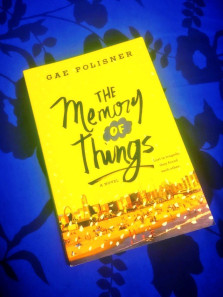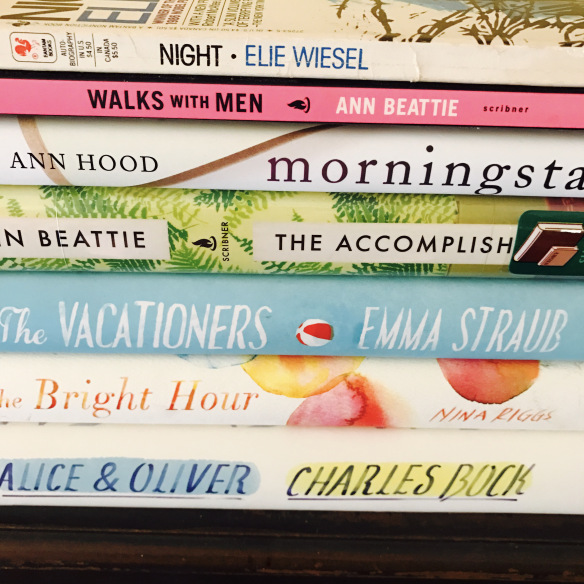
Polisner, Gae. The Memory of Things. Wednesday Books, 2016.
Everyone has their own September 11th narrative. Here’s mine.
I was a sophomore in high school, enjoying the final minutes of my first period History class. An announcement came over the intercom: all teachers were instructed to turn on their television sets and stay abreast of the news. After seeing the images of fire and smoke and terror, I can remember a feeling of helplessness and an acute awareness of the world that I hadn’t felt before. That evening, my parents began repainting my bedroom a cheery yellow color which clashed strongly with the mourning that permeated the rest of the world.
After attending BookCon in New York City this summer, my husband and I visited the September 11th memorial. As we viewed the etched names of the lost in the drizzling rain, the enormity of the event struck me once again. I thought, too, of my students, many of whom were born after 2001. Would they ever understand how that day—how those losses—changed everything?
When I received an e-mail from Macmillan with a description of Gae Polisner’s The Memory of Things—a YA novel recounting one teenager’s September 11th experience—I jumped at the chance to read and review it. I hoped that this might be a tool in assisting my students’ understanding.
On September 11th, 2001, Kyle Donohue watches the collapse of the first Twin Tower from his nearby high school. He and his classmates evacuate and scramble toward their homes, a journey that takes Kyle across the Brooklyn Bridge. As he moves with other New Yorkers—all frightened and shocked, most covered in ash and debris—he spots a girl sporting costume wings, poised as though prepared to jump from the bridge. Kyle pulls this stranger back before taking her hand and, for reasons even he doesn’t understand, leading her to his apartment. He asks her name; the girl, frozen in fear, says she doesn’t remember.
Kyle’s father works as part of the Terrorism Task Force in NYC; Kyle’s panicked mother is awaiting a flight out of California. Therefore, Kyle is solely responsible for this winged stranger and the care of his paralyzed uncle, Matt. As Kyle struggles to piece together what is happening in New York City and around the country, he is also attempting to uncover information about the winged girl and the source of her amnesia. Where did she come from? Is anyone looking for her? Were both her parents killed in the towers?
The Memory of Things brought back many painful but accurate facets of the September 11th terror attacks—the barrage of constant news coverage, the various rumors and snippets of false information, the immediate kindness and unity of the entire country. It is interesting, too, that the narration shifts between Kyle and the winged stranger. Her point-of-view is written in free verse, a fitting style that speaks to her spotty memory. One thing that particularly stood out to me is Kyle’s desire to seek out information about international tragedies in the wake of the terror attacks. Kyle’s friend Marcus, for example, is a survivor of the Ugandan Bush War, and his sudden understanding of his friend’s hardships was both poignant and important.
The novel is divided into sections with headings, and these mostly confused me as I read. The sections are not accompanied by page breaks, so I at first thought the headings were part of the text. The headings, too, seemed largely unimportant and sometimes even gave away what was going to occur in the pages to come. I found myself wishing that the headings and sections would be removed altogether, and the book could stand as is.
Although the selfish English teacher in me would love to recommend this novel for language arts classes only, The Memory of Things is the type of book that reaches across the curriculum. History teachers who are trying to capture the feelings and trepidation after September 11th would be wise to check out Polisner’s novel. Those who teach psychology classes or units on mental health issues might also find it pertinent—there’s a great deal in the book about memory and the processes of the brain. Overall, any educator struggling with the lack of understanding—and sometimes lack of empathy—that can emerge when talking about September 11th will find it a touching and useful text.
Share this:




